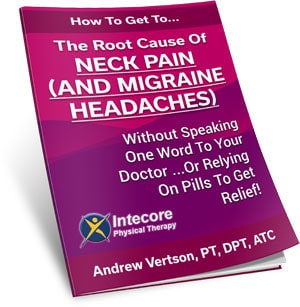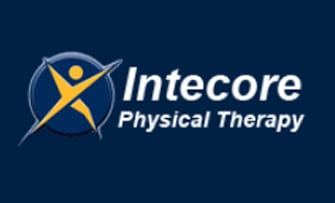
Are your neck pain and headaches more interconnected than you realize?
If you’ve ever found yourself grappling with both, you’re not alone. In this blog, we’ll take a look at the relationship between neck pain and headaches. Understanding this connection is crucial for effective management and relief. So, let’s take a look at how to tell if your headaches could be cause by neck pain and what to do about it.
More Posts Like This From Intecore Physical Therapy:
How to Sleep Comfortably with Neck Pain
5 Causes of Neck Stiffness and How to Combat Chronic Neck Pain
Can Physical Therapy Help A Stiff Neck?
Table of Contents
Understanding the Link Between Neck Pain and Headaches
Have you ever noticed that when your neck starts acting up, it’s often followed by a pounding headache? That’s no coincidence. The truth is, there’s a tight-knit relationship between neck pain and headaches that many people overlook. When the muscles, joints, or nerves in your neck become irritated or inflamed, they can send signals to your brain that trigger headaches. It’s like a domino effect – one problem in your neck can quickly lead to discomfort in your head.
So, how exactly do neck issues cause headaches? Well, it all comes down to the intricate network of nerves and blood vessels that run through your neck and head. When there’s tension or misalignment in your neck muscles or vertebrae, it can put pressure on these nerves and blood vessels, disrupting their normal function. This disruption can lead to a variety of headache types, including tension headaches, migraines, and cervicogenic headaches, which originate from the neck itself.
Next, let’s talk about posture – you know, that thing your mom always nagged you about. Turns out, mom was onto something. Poor posture, whether from slouching at your desk or hunching over your phone, can wreak havoc on your neck and shoulders, leading to muscle tension and strain. And when those muscles are tight and achy, it can compress nerves in your neck, causing even more pain and discomfort. Add in factors like stress, lack of sleep, or repetitive motions, and you’ve got a recipe for headache central.
But here’s the good news – by understanding the link between neck pain and headaches, you’re already on the path to finding relief. With the right knowledge and approach, you can break free from the cycle of discomfort and reclaim your headspace – literally!
5 Signs Neck Pain May Be Causing Headaches
1. Persistent Tension in the Neck Muscles
Do you find yourself constantly rubbing your neck or shoulders, trying to alleviate tension? If your neck muscles feel tight and achy most of the time, it could be a sign that they’re contributing to your headaches. Persistent muscle tension in the neck can put pressure on surrounding nerves and blood vessels, leading to headache symptoms.
2. Headaches Triggered by Neck Movements or Positions
Have you noticed that certain neck movements or positions seem to trigger your headaches? For example, tilting your head back to look up or turning your head to the side might worsen your headache symptoms. This sensitivity to neck movements suggests that your headaches may be originating from issues in the cervical spine.
3. Limited Range of Motion in the Neck
Is your neck feeling stiff and inflexible? Difficulty turning your head from side to side or tilting it forward and backward could indicate underlying neck problems that are contributing to your headaches. Limited range of motion in the neck is often a telltale sign of musculoskeletal issues that need attention.
4. Presence of Neck Pain Before or During Headaches
Do you notice neck pain either before or during the onset of your headaches? If your neck discomfort tends to precede or coincide with your headache episodes, it’s a strong indication that the two are connected. This relationship between neck pain and tension headaches is a significant clue for identifying their underlying cause.
5. Relief from Headaches with Neck-Specific Treatments
Have you ever experienced relief from your headaches after receiving treatments specifically targeted for your neck? Whether it’s massage therapy, cervical manipulation, or stretching exercises, if interventions aimed at addressing neck issues lead to improvements in your headache symptoms, it further supports the notion that your neck is playing a significant role in your headaches!
How Physical Therapy Can Help Neck Pain and Headaches
Physical therapy offers a multifaceted approach to relieving neck pain and headaches. Through comprehensive assessment and diagnosis, we tailor treatment plans to address individual needs. We employ hands-on techniques like joint mobilization and manual stretching to release tension and improve mobility in the neck muscles and joints. Alongside this, personalized exercise programs strengthen muscles, enhance flexibility, and correct posture, reducing strain on the cervical spine.
Moreover, education on proper body mechanics, ergonomic adjustments, and self-management strategies empowers patients to take an active role in their recovery. By learning to recognize triggers and adopt preventive measures, individuals can effectively manage their symptoms long-term. With a focus on holistic care and sustainable solutions, physical therapy equips patients with the tools they need to live pain-free and regain control of their lives
Ready To Get Help With Physical Therapy?
If you’ve found this blog helpful and are ready to take action towards relieving your neck pain and headaches, we’re here to help. Simply click here to fill out a form and share your concerns with us, and our dedicated team will reach out to assist you.
Alternatively, you can reach us directly by calling 949-565-4944. Let’s work together to address your discomfort and improve your quality of life.
If you’re not ready to speak on the phone, click here to download our neck pain and headaches tips guide! It’s 100% free.

- 5 Ways to Treat Chronic Back Pain Without Surgery - July 21, 2024
- 10 Back-Saving Tips for Gardening This Summer - July 14, 2024
- 5 Sciatica-Friendly Travel Tips for Your Summer Vacation - July 7, 2024












